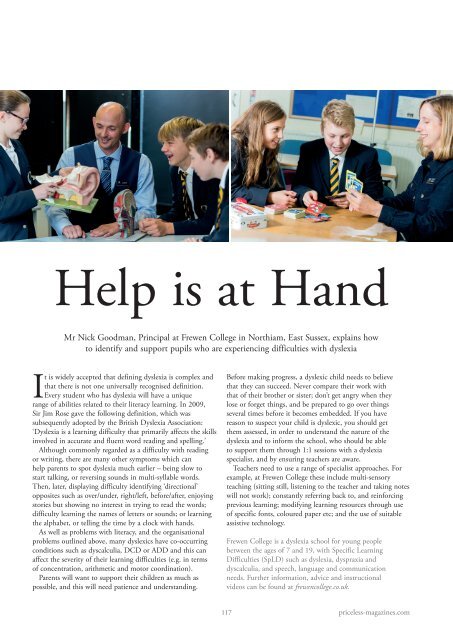Surrey Homes | SH71 | Sept & Oct 2020 | Kitchen & Bathroom supplement inside
The lifestyle magazine for Surrey - Inspirational Interiors, Fabulous Fashion, Delicious Dishes
The lifestyle magazine for Surrey - Inspirational Interiors, Fabulous Fashion, Delicious Dishes
You also want an ePaper? Increase the reach of your titles
YUMPU automatically turns print PDFs into web optimized ePapers that Google loves.
Help is at Hand<br />
Mr Nick Goodman, Principal at Frewen College in Northiam, East Sussex, explains how<br />
to identify and support pupils who are experiencing difficulties with dyslexia<br />
It is widely accepted that defining dyslexia is complex and<br />
that there is not one universally recognised definition.<br />
Every student who has dyslexia will have a unique<br />
range of abilities related to their literacy learning. In 2009,<br />
Sir Jim Rose gave the following definition, which was<br />
subsequently adopted by the British Dyslexia Association:<br />
‘Dyslexia is a learning difficulty that primarily affects the skills<br />
involved in accurate and fluent word reading and spelling.’<br />
Although commonly regarded as a difficulty with reading<br />
or writing, there are many other symptoms which can<br />
help parents to spot dyslexia much earlier – being slow to<br />
start talking, or reversing sounds in multi-syllable words.<br />
Then, later, displaying difficulty identifying ‘directional’<br />
opposites such as over/under, right/left, before/after, enjoying<br />
stories but showing no interest in trying to read the words;<br />
difficulty learning the names of letters or sounds; or learning<br />
the alphabet, or telling the time by a clock with hands.<br />
As well as problems with literacy, and the organisational<br />
problems outlined above, many dyslexics have co-occurring<br />
conditions such as dyscalculia, DCD or ADD and this can<br />
affect the severity of their learning difficulties (e.g. in terms<br />
of concentration, arithmetic and motor coordination).<br />
Parents will want to support their children as much as<br />
possible, and this will need patience and understanding.<br />
Before making progress, a dyslexic child needs to believe<br />
that they can succeed. Never compare their work with<br />
that of their brother or sister; don’t get angry when they<br />
lose or forget things, and be prepared to go over things<br />
several times before it becomes embedded. If you have<br />
reason to suspect your child is dyslexic, you should get<br />
them assessed, in order to understand the nature of the<br />
dyslexia and to inform the school, who should be able<br />
to support them through 1:1 sessions with a dyslexia<br />
specialist, and by ensuring teachers are aware.<br />
Teachers need to use a range of specialist approaches. For<br />
example, at Frewen College these include multi-sensory<br />
teaching (sitting still, listening to the teacher and taking notes<br />
will not work); constantly referring back to, and reinforcing<br />
previous learning; modifying learning resources through use<br />
of specific fonts, coloured paper etc; and the use of suitable<br />
assistive technology.<br />
Frewen College is a dyslexia school for young people<br />
between the ages of 7 and 19, with Specific Learning<br />
Difficulties (SpLD) such as dyslexia, dyspraxia and<br />
dyscalculia, and speech, language and communication<br />
needs. Further information, advice and instructional<br />
videos can be found at frewencollege.co.uk.<br />
117 priceless-magazines.com


















